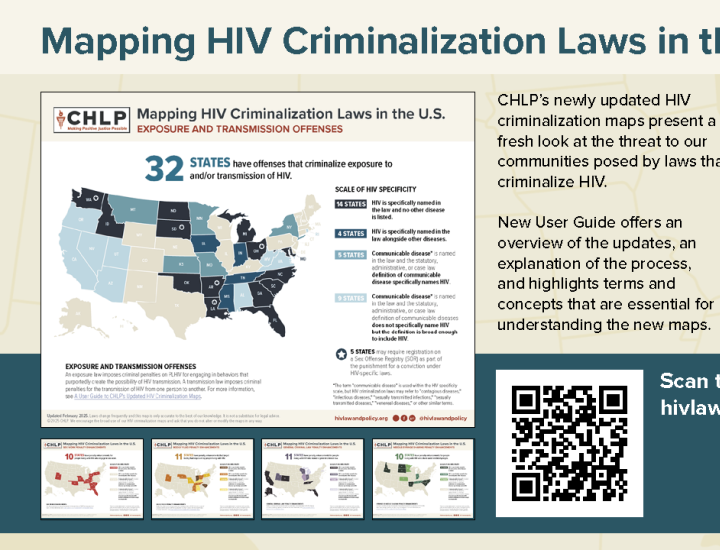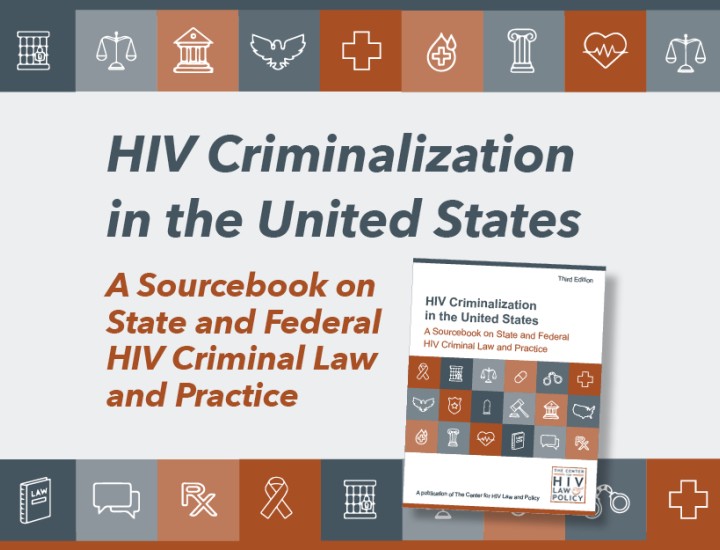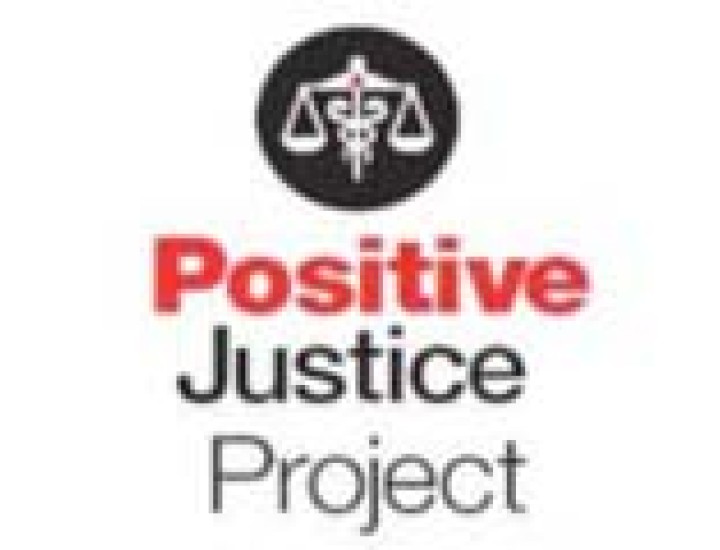
While we have made every effort to ensure that this information is correct and current, the law is regularly changing, and we cannot guarantee the accuracy of the information provided. This information may not be applicable to your specific situation and is not, and should not be relied upon, as a substitute for legal advice.
HIV-Specific Criminal Laws
Alabama does not have an HIV-specific criminal statute.
For detail on the selected state law and cases interpreting it, see Alabama: Analysis & Codes, an excerpt from CHLP’s recently updated compendium of HIV- and STI-related criminal laws and civil laws relating to public health control measures in all 50 states, the military, and U.S. territories. To view the publication in its entirety, see HIV Criminalization in the U.S. A Sourcebook on State Fed HIV Criminal Law and Practice. Methodology is explained in the Introduction (page 5).
People living with an STI can face misdemeanor charges for exposure.
People living with a communicable disease (including HIV) can face enhanced felony penalties for exposing others to bodily fluids.
PLHIV have been prosecuted under a criminal law for "assault with bodily fluids," which carries a felony enhancement if the defendant has any "communicable disease."
State Guidelines on Health Care Workers with HIV
We currently are in the process of reviewing and updating our resources and summaries related to health care workers and disclosure. In the meantime, please do not rely on this information as current, and get in touch with CHLP with any questions.
Physicians, dentists, nurses, respiratory therapists, phlebotomists, surgical technicians, physician assistants, podiatrist, dialysis technicians, emergency medical technicians, paramedics, ambulance drivers, dental hygienists, dental assistants, students in the healing arts, or any other individual who provides or assists in the provision of medical, dental, or nursing services.
Voluntary testing. HCW must notify the State Health Officer of infection in a time and manner prescribed by State Board of Health.
An expert review panel (ERP) will recommend to State Health Officer (SHO) about the need to retroactively notify patients who previously may have had an invasive procedure performed by an infected HCW.
HCW with knowledge of infection cannot perform or assist in invasive procedures until he has notified the SHO and has agreed to cooperate in an investigation and any necessary practice modification. If invasive procedures are not done by HCW, then no ERP will be convened and no restrictions on practice will be imposed. If invasive procedures are conducted, then an ERP will be convened and will make recommendations to the SHO regarding any limitations on HCW that are reasonable and necessary to protect patients. Factors to be considered are: procedures performed, adherence to universal precautions, past history of injury while performing procedures, prior evidence of transmission, physical and mental health, and current CDC prevention guidelines on the management
Minors' Access to STI and HIV Testing and Treatment
These summaries highlight key aspects of state laws governing the rights of minors to consent to testing and/or treatment for sexually transmitted infections (STIs) and HIV. Any such summary cannot capture the details and nuances of individuals state laws. Although roughly a third of the states permit health care providers to inform a minor's parents that their child is seeking STI-related services, none require it. Also, the law is fluid, and these summaries may not reflect recent legislative change in a particular state.
Every state in the country allows minors to consent to STI testing and care without parental approval, although a number of these set an age threshold for the right to consent without parental involvement. In these states, the minimum age ranges from 12 to 14 years of age.
As of the date of this posting, thirty-one states allow minors to also consent to HIV testing and treatment without parental approval.
HIV Testing
Unlike testing for most other infectious diseases, testing for HIV involves possible benefits as well as social, economic, and legal consequences that typically are not apparent or known to an individual considering testing. HIV-related testing is the gateway to health-preserving treatment; it also can be the basis of criminal prosecution for those who are sexually active, or relied on to exclude individuals who test positive for HIV from programs, employment, or insurance. Although state and federal laws prohibit much of this discrimination against people with HIV, the ability to enforce those rights usually depends on access to free legal services, which are increasingly limited and not available at all in roughly half of the states in the United States. Thus, the potential negative consequences of HIV testing at a particular time or location might inform an individual's decision of whether or when to get tested for HIV; or whether to test anonymously or through a "confidential" testing process that reports their test results and identifying information to the state but maintains the confidentiality of those results.
The American Medical Association has long defined informed consent as a process of communication between a patient and physician that results in the patient's authorization or agreement to undergo a specific medical intervention. Although informed consent is a legal concept rather than a medical one, many states use definitions of "informed consent" for purposes of HIV testing and medical procedures that in fact are inconsistent with the accepted legal definition, e.g., they do not require that an individual receive information or sometimes even notification that they are about to be tested for HIV. The Center for HIV Law and Policy (CHLP) accepts the legal and court-affirmed definition of informed consent; therefore, state protocols that call for "opt-out" testing (a patient is tested for HIV unless she/he objects) or that mirror general consent approaches are not counted as "informed consent" laws even in those instances where the state legislature has characterized their state law as requiring "informed consent." In short, CHLP does not consider or count laws that allow a patient's silence or general consent as granting authority to do confidential HIV testing as informed consent laws.
Notification to sexual partners of possible HIV exposure is required.
Find the laws in a different state.
Copyright Information: CHLP encourages the broad use and sharing of resources. Please credit CHLP when using these materials or their content. and do not alter, adapt or present as your work without prior permission from CHLP.
Legal Disclaimer: CHLP makes an effort to ensure legal information is correct and current, but the law is regularly changing, and the accuracy of the information provided cannot be guaranteed. The legal information in a given resource may not be applicable to all situations and is not—and should not be relied upon—as a substitute for legal advice.


